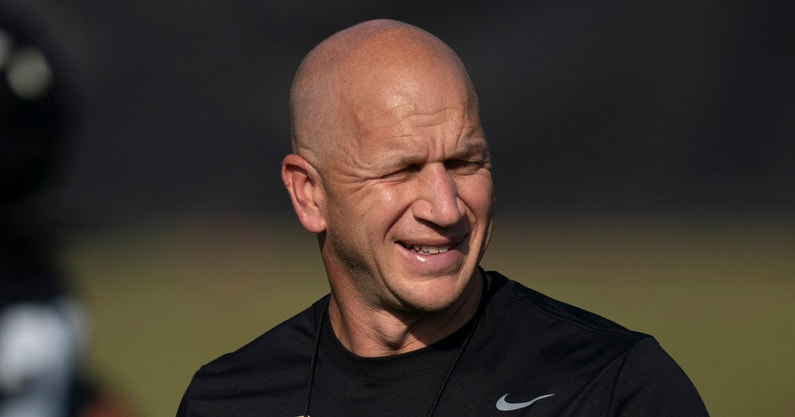Clark Lea addresses Langston Patterson lawsuit vs. NCAA, potential impact on Diego Pavia

Less than a year after Vanderbilt quarterback Diego Pavia successfully petitioned the NCAA for an additional year of collegiate eligibility inside a Tennessee court room, several of his Commodore teammates are following suit with a class-action lawsuit of their own.
Vanderbilt linebacker Langston Patterson is leading a new legal effort against the NCAA’s “redshirt rule” that grants collegiate athletes five years to play four seasons, leaving room for one redshirt season due to injury or lack of playing opportunities.
SUBSCRIBE to the On3 NIL and Sports Business Newsletter
During an appearance on the SEC’s weekly coaches teleconference Wednesday, Commodores head coach Clark Lea acknowledged the suit but declined to get too in-depth into the matter.
“I’m aware obviously of the lawsuit. I don’t know all the ins and outs and so I’d hesitate to make comment on it other than to say I’m aware of it,” Lea said on Wednesday’s SEC teleconference. “And obviously we’ll always work in support of the players and the best experience we can create here at Vanderbilt. But I don’t want to go further than that just because I don’t know the ins and outs and this is all kind of new to me.”
The class-action suit was filed Tuesday in Nashville’s Middle District of Tennessee by co-counsel Ryan Downton, who represented Pavia in his eligibility lawsuit vs. the NCAA in December. A U.S. District Court of Middle Tennessee judge granted Pavia a preliminary injunction against the NCAA that granted the Vanderbilt QB an extra season off eligibility after deeming the NCAA’s redshirt rule regarding junior college eligibility a violation of antitrust law.
Delving into the new class-action lawsuit vs. the NCAA’s five-year eligibility rule
Tuesday’s lawsuit follows a similar tact that states the redshirt rule that limits student-athletes to only compete in four of the five seasons they’re allotted has “the unjustifiable effect of suppressing athletic careers, limiting college athletes’ institutional mobility, and unlawfully restraining the market for college athletes’ services.”
Top 10
- 1New
Eli Drinkwitz comes clean
Knew rule was broken
- 2
Deion Sanders
Fires back at media
- 3Hot
Big 12 punishes ref crew
Costly mistake in Kansas-Mizzou
- 4Trending
CFP Top 25
Predicting Top 25 after Week 2
- 5
National Title odds
Numbers shift after Week 2
Get the Daily On3 Newsletter in your inbox every morning
By clicking "Subscribe to Newsletter", I agree to On3's Privacy Notice, Terms, and use of my personal information described therein.
The aim is to allow student-athletes all five years to compete in college: “Plaintiffs seek relief under federal law to strike down these unreasonable restraints and vindicate college athletes’ rightful opportunity to compete throughout their eligibility window,” according to the lawsuit language.
The lawsuit goes on to argue that the “redshirt rule,” when combined with the NCAA’s four seasons of competition rule, serves to act as an anticompetitive device rather than as a reasonable eligibility boundary. That’s the fundamental point the lawsuit will likely hinge on.
The plaintiffs further outline how athletes’ opportunities are harmed by the current implementation of the four seasons of competition rule and the redshirt rule. The lawsuit states the following:
“These overlapping Rules distort the market for Division I athletics by penalizing academically eligible high-performing college athletes who choose to compete instead of redshirting, thereby forcing them to forfeit a year of potential competition and market value without any legitimate procompetitive justification.”
— On3’s Thomas Goldkamp contributed to this report.